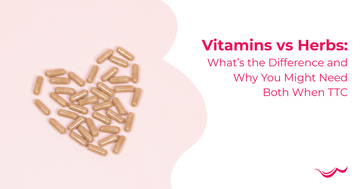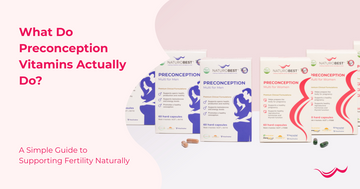How to Treat PCOS & Irregular Periods Naturally
by Nikki Warren on Jun 28, 2022

Polycystic Ovarian Syndrome (PCOS) is quite common with up to 8-13% of women suffering from the condition. Women diagnosed with PCOS will commonly seek advice on how to treat PCOS and irregular periods naturally.
PCOS does not have a one specific cause. However, four out of every five women with PCOS have insulin resistance. Basically, this means you have high levels of insulin and are unable to regulate blood glucose efficiently leading to weight gain.
I was diagnosed with PCOS myself as a 27-year-old. It was extremely frustrating that no matter how much I dieted or exercised, the weight just refused to shift. In despair, I went to numerous specialists and complementary medicine practitioners. I finally saw a naturopath who was able to help me.
She put me on a strict “O blood type diet” and gave me a herbal medicine formulation that changed my life. My acne disappeared and the weight started to fall off easily.
This magical result was what led me to start studying naturopathy. It also gave me the desire to help other women with the same issues I’d had.
The following is what I learned along the way.
Signs and Symptoms of PCOS
Sometimes a woman can have only two of these PCOS symptoms or all of them. This can make it difficult to diagnose. No one knows your body better than you. If you are struggling to receive a diagnosis for your symptoms, seek a second opinion.
- Irregular menstrual cycle or no cycle at all for one or more years. This can happen after coming off the oral contraceptive pill and is a classic sign of PCOS.
- Infertility due to irregular or absent ovulation.
- An ultrasound reveals multiple cysts on the ovaries (not every woman who has cysts has PCOS though).
- Acne - often on the chin.
- Excessive facial or body hair.
- Anxiety and depression.
- Weight gain and difficulty losing weight.
- Blood tests usually reveal: elevated luteinising hormone (LH). Decreased follicle-stimulating hormone (FSH). High testosterone and DHEA-S, high insulin and commonly high oestradiol. Oestradiol, FSH and LH should be tested on day 3 of your cycle (if you are menstruating).
- Low or no progesterone is also common. This is because progesterone is only produced when ovulation occurs and so this test must be performed 7 days after ovulation. Ovulation can be detected with an ovulation predictor kit (OPK).
- Some women use an OPK to detect ovulation. If you have a positive result for 6 days in a row this means you have elevated LH levels. This can indicate that it is likely you have PCOS.
PCOS Treatment
Unfortunately, there are no effective medical treatments to cure PCOS, however there are drugs that can be prescribed for the symptoms. Metformin is often prescribed to regulate insulin and blood sugar levels. Spironolactone can be prescribed for high testosterone levels.
My personal experience with these drugs were that Metformin made me feel bloated and I actually gained more weight on it. Even though I had acne, I did not have high testosterone and so Spironolactone did absolutely nothing. Other women may have a positive experience though.
PCOS Diet and Weight Loss
The first place to start when treating any condition naturally is diet. Food is often overlooked as the most remarkable medicine on the planet. It matters what we eat in PCOS.
We can be well balanced and full of energy from our dietary choices. Eating a diet low in nutrients can contribute to a state of dis-ease.
The goal with a PCOS diet is to stabilise blood sugar levels. This can be achieved by increasing protein intake (meat, seafood, eggs, brown rice, protein powder, tofu, nuts and seeds). As well as increasing good fats such as olive oil, avocado, oily fish, nuts and seeds. Decreasing carbohydrates (cereals, white rice, bread, sugary drinks, processed packet food) may also be beneficial.
Cinnamon is a fantastic herb for stabilising blood sugar. Try adding it to your cappuccino (decaf to avoid blood sugar spikes), protein shakes or smoothies.
It is recommended to drink plenty of filtered water. This is essential when you are losing weight and trying to clear acne from your skin. It is recommended to consume 2-3 litres daily.
Soft drink consumption can significantly impair our health. There is no health benefit to consuming soft drinks. A great alternative is Kombucha or Mount Franklin Sparkling Water which comes in different flavours such as raspberry, lime and mango.
A good alternative to juice (which is full of sugar) is the Ocean Spray low sugar cranberry juice. Make sure it is low sugar which contains stevia, not sugar free which contains aspartame.
Herbal Medicine for PCOS
When it comes to treating hormonal conditions, herbal medicine really shines. As a naturopath and herbalist, I loved being able to formulate a specific herbal blend for each patient of mine.
When it comes to PCOS though, the formula rarely changes. White peony and licorice are well known as an evidence-based treatment for PCOS, helping to regulate the menstrual cycle. Other herbs are added as support for the symptoms that accompany PCOS such as acne and weight gain. These are some of my favourites:
Dong Quai
This herb is known as a uterine tonic in traditional Western herbal medicine. It is often prescribed by herbalists for menstrual irregularity. In my practice, I found it to be brilliant for women who had amenorrhoea (an absence of periods) that weren’t responding to other herbal protocols.
Dong quai should not be taken during pregnancy. If you are using this herb prior to trying to conceive, there are important things to note. It is best to stop taking it when you have reached day 14 of your cycle (or a positive ovulation test).
Burdock
Burdock is one of my favourite herbs for skin conditions such as acne, eczema or psoriasis. The naturopath who treated me for my PCOS included burdock in my herbal formula. My acne started to resolve within three weeks. You can see how my love affair with herbal medicine began…
Nettle leaf
Nettle is full of nutrients and like burdock, is known as a depurative. A depurative is a substance that improves detoxification and aids elimination. This makes it a great addition to the herb burdock for chronic skin conditions. Another reason I love nettle leaf is that it is a fantastic herbal treatment for allergies such as hayfever.
Gymnema
This herb is known as the “sugar destroyer”. Holding liquid Gymnema on your tongue before swallowing reduce your taste-buds from tasting sweet flavours. This is my favourite herb for people with insulin resistance. It is brilliant at reducing sweet cravings which in turn helps with weight loss.
If you are an insulin-dependent diabetic or are taking medication such as Metformin, you will need to consult with both your herbalist and doctor prior to taking Gymnema.
Inositol
Inositol (otherwise known as myo-inositol) was once thought of as a B vitamin. However, it is now known that it is produced in the human body and is considered to be a sugar alcohol. Studies in women with PCOS, have found that inositol improved glycaemic and lipid parameters.
It improved their blood sugars and fats, as well as ovulation and pregnancy rates. It was often combined with folate in the studies.
Chaste Tree
A woman with PCOS may or may not have high oestradiol (oestrogen) levels with PCOS. For best results, this should also be treated. What she will most certainly have, is oestrogen dominance (high oestrogen in relation to progesterone).
She may also have elevated prolactin levels. This is best tested on day 21 of the cycle or 7 days after ovulation along with progesterone. High prolactin levels can contribute to increased oestrogen levels.
Chaste tree is often prescribed by herbalists to support progesterone and lower prolactin. It is a fantastic herb for regulating the menstrual cycle. It is usually taken in the morning before breakfast.
PCOS and Pregnancy
It may take multiple months of following these changes and herbal protocol above to see any changes in your menstrual cycle. Once a regular cycle is established and weight loss is achieved (if you are overweight), your chances of conception are increased.
Of course, this also depends on several other factors that affect fertility such as sperm quality and frequency/timing of sex. But you should be reassured that PCOS is not usually a diagnosis of permanent infertility.
In fact, after I had my daughter, I resumed a normal menstrual cycle within months! My weight began to normalise after having my daughter as well.
A scan of my ovaries at a later date revealed that I no longer had polycystic ovaries. My hormone levels were within normal range as well, what a relief. This was an experience several of my clients had as well. Perhaps there is a link between giving birth to a baby and a reduction in PCOS symptoms.
Your PCOS Healthcare Team
The best place to start is to chat with your GP about getting some blood tests done and perhaps an ultrasound.
Once you have a copy of the results, you can find a fertility naturopath or herbalist in your area. They may offer some dietary and lifestyle advice along with a herbal and nutritional prescription. Herbal medicine and acupuncture go well together. It's a good idea to also search for an acupuncturist who has an interest in fertility or hormonal conditions.
If you are trying to conceive, a consultation with a fertility specialist is a good idea. This can be done in conjunction with your complementary medicine practitioners.




